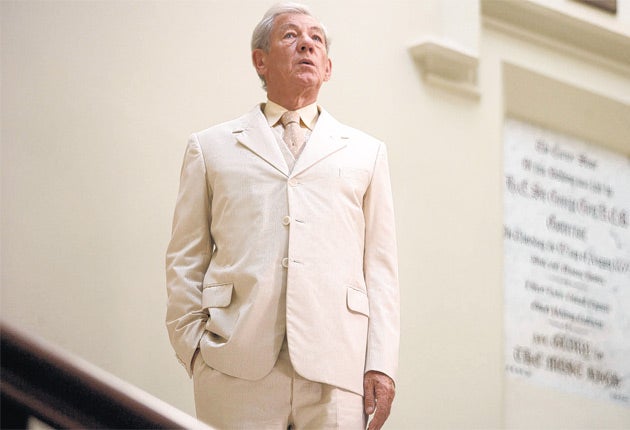The Weekend's Television: The Prisoner, Sat, ITV1<br/>Louis Theroux: America's Medicated Kids, Sun, BBC2
No escaping the cruel truth

Your support helps us to tell the story
From reproductive rights to climate change to Big Tech, The Independent is on the ground when the story is developing. Whether it's investigating the financials of Elon Musk's pro-Trump PAC or producing our latest documentary, 'The A Word', which shines a light on the American women fighting for reproductive rights, we know how important it is to parse out the facts from the messaging.
At such a critical moment in US history, we need reporters on the ground. Your donation allows us to keep sending journalists to speak to both sides of the story.
The Independent is trusted by Americans across the entire political spectrum. And unlike many other quality news outlets, we choose not to lock Americans out of our reporting and analysis with paywalls. We believe quality journalism should be available to everyone, paid for by those who can afford it.
Your support makes all the difference.Let no one suggest that ITV didn't push the boat out for its remake of The Prisoner. The original was filmed in Wales; for this version, they went to Namibia.
The inimitably wonky style of the 1960s classic has been replaced by a rather glossier look. And whereas Patrick McGoohan's opus mostly put minor players around Number Six – with the notable exception of Leo McKern – Jim Caviezel is surrounded by stars, from the grandeur of Ian McKellen to thrusting young Brits Hayley Atwell and Ruth Wilson.
None of this exactly explains why the show is so unutterably boring, but it may suggest why no one at ITV seems to have minded very much. A tale of an ordinary New Yorker transplanted to a tiny and inescapable dystopia governed by an inscrutable dictatorship should be sufficiently intriguing to make fantastic Saturday night fare. Instead, there's just tedium.
After our hero woke up in the desert and made his way to his new home in the Village, he spent about 45 minutes wandering around town asking people what was going on. Possibly if he were being pursued by authoritarian goons that might be interesting, but no one seemed that bothered. The most malevolent thing Ian McKellen managed as lead villain Number Two was to eat a piece of cherry cake with a faintly ominous scowl.
In the meantime, we watched a thoroughly wooden Jim Caviezel scratching his head, and hardly learning anything. A decent explosion towards the end of the episode, the first of six, suggested that things may pick up a bit, at least in terms of action, as the series proceeds. But I have a sneaking suspicion that even as superficial mysteries are solved – what are those shining towers on the horizon? Is that taxi driver one of the good guys? – the viewer's fundamental questions will remain unanswered: do they seriously expect us to be scared by the blob patrolling the Village's perimeter, and why do they only eat things in wraps?
That blob, of course, is lifted straight from the original, where it was a genuinely menacing addition to the show's meticulously imagined world; here, it's just ridiculous. The Prisoner may pay lip service to its predecessor, but lip service is all it is. Long on influence, it is fatally short on inspiration.
Ten-year-old Hugh Kelly, the undoubted star of Louis Theroux's latest documentary, America's Medicated Kids, occupied a similarly unfamiliar world, but his was not an imaginary one. His doctors said that Hugh suffered from ADHD, Asperger's, oppositional defiant disorder and bipolar disorder.
Hugh lived in a household where even the dog was on anti-anxiety pills, and Theroux's central question was whether kids like Hugh were overmedicated. It was certainly a question worth asking; as ever with Theroux, though, you were left feeling that the playing field hadn't quite been level.
For one thing, in spite of its provocative title, the show never actually cited a shred of evidence that American children are more likely to be medicated than British ones. For another, the sly interrogatory techniques that are so entertaining and revelatory when trained on Jimmy Savile or a neo-Nazi just felt a bit mean here: asking a lonely boy who his best friend is, for instance, seemed intended at producing the sort of reaction that it duly received.
No one influential got asked any difficult questions, and no conclusions were reached; instead, we were left with an awkward sort of medical tourism. Still, there was no doubting the charm of Theroux's subjects. Hugh's high point came when he was allowed to direct his own interview, and, his sense of grandiosity indulged, his equally innate sweetness was also allowed to shine through. "Do you feel like you know more than me?" Louis asked; "Mostly, yes," Hugh replied. It was hard to disagree.
a.bland@independent.co.uk
Join our commenting forum
Join thought-provoking conversations, follow other Independent readers and see their replies
Comments